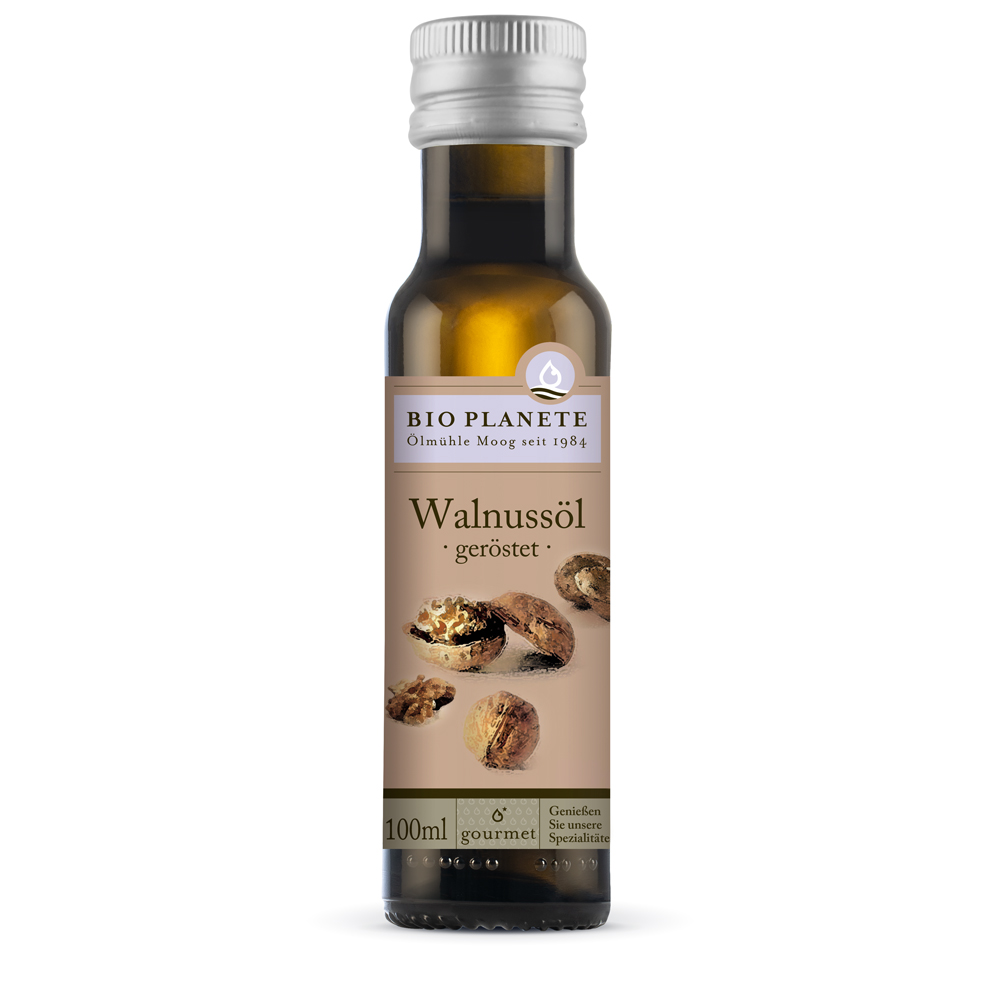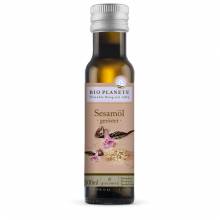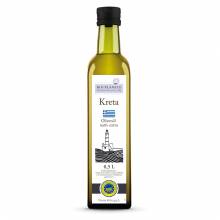Walnut Oil
· Toasted ·
100 ml
The roasted version of Walnut Oil is ideal for lovers of a noble walnut flavour. In this fine gourmet oil, walnut kernels are gently roasted directly before pressing, which creates an even more intense aroma. We source the raw materials for this oil from French agriculture and small-scale farming structures in Moldova, which ensures local year-round employment.
Walnut oil is rich in alpha-linolenic acid (omega-3 fatty acid), an essential polyunsaturated fatty acid, and is therefore particularly valuable not only in culinary terms but also in terms of nutritional physiology. Replacing saturated fatty acids with simple and/or polyunsaturated fatty acids in nutrition contributes to the preservation of normal blood cholesterol levels.
Recipe ideas and use of Toasted Walnut Oil
Toasted Walnut Oil must not be heated. The oil is excellent for the preparation of crème dishes and desserts. In the bakery, it gives a wonderful fragrance and flavour to cookies or cakes by adding it to the icing. The oil also adds variety to salads or fish dishes. For example, you might like to try a dressing with Toasted Walnut Oil and sherry vinegar or lemon juice.
It is important to maintain a varied and balanced diet and a healthy lifestyle.
Do you also know our Virgin Walnut Oil and Toasted Almond Oil?
Product of organic farming
** For this product, the raw materials may in some cases originate from other countries. This especially holds true in cases of crop shortfall, or when batches of raw goods do not meet our quality requirements. In any event, the raw material are being tested by BIO PLANÈTE and are in 100% compliance with our strict organic quality requirements. The respective origin is always noted on the product label.
Average nutritional values per 100 ml / 3.38 fl oz
** Percent Daily Values are based on a 2,000 calorie diet.
On average in 100 ml: Alpha-linolenic acid (Omega 3): 9 g/ 0,32oz
-
Why are unsaturated acids healthier than saturated fatty acids?
This is true primarily for all polyunsaturated acids, meaning omega 3 and omega 6 fatty acids. These occur more rarely in foods than mono-unsaturated and saturated fatty acids. In addition, the human body cannot make these fatty acids itself, so it depends on a sufficient intake of omega 3 and omega 6 acids from food. They have several important functions in the body, form part of cell membranes and contribute to preserving normal cholesterol levels, blood pressure and a normal cardiac function.
-
What is the difference between omega 3 and omega 6 acids?
The difference lies in the chemical structure of the molecules. Both classes of fatty acids are essential for humans, meaning our bodies cannot product them and depend on a sufficient intake from food. Nutritional sources of omega 3 fatty acids are exclusively marine algae, fish and plant oils and seeds. Unfortunately, we tend to take in far too little of these important fatty acids. Our daily nutrition gives us a ratio of omega 6 fatty acids to omega 3 fatty acids of approx. 15:1. The German Nutritional Association recommends a ratio of 5:1.
For example, the BIO PLANÈTE Salad Oil provides this optimal ratio of omega 6 to omega 3 fatty acids. If you want to balance out your omega-ratio with oils rich in omega 3, you can e.g. revert to Flaxseed Oil or our Omega Colour Oils. -
Where does the polyunsaturated fatty acid omega 3 occur?
Omega 3 fatty acids occur in plant seeds and plant oils as well as is saltwater fish and marine algae. Therefore, the German Nutritional Association recommends eating fish twice a week in order to supply the body with sufficient omega 3 fatty acids. Flaxseed Oil, Hempseed Oil, Camelina Oil and the BIO PLANÈTE Omega Colour Flaxseed mixtures have an especially high proportion of omega 3.
Omega 6 fatty acids are much more common: these fatty acids are also found in animal fats. That's why our daily nutrition contains more omega 6 fatty acids than omega 3 fatty acids, with the ratio being approx. 15:1. The German Nutritional Association recommends a ratio of 5:1. The BIO PLANÈTE Salad Oil provides this optimal ratio of omega 6 to omega 3 fatty acids. -
How can vegans meet their requirement of omega 3?
If you follow a vegan diet, dislike the taste of fish or cannot eat fish regularly (2x per week) for other reasons, you should make sure to keep a high-quality plant oil rich in omega 3 fatty acids in your fridge and use this to cover your requirement of these essential fatty acids. Flaxseed Oil, Hempseed Oil, Camelina Oil and the BIO PLANÈTE Omega Colour Flaxseed Oil Mixtures are particularly suitable for this. The latter have not just a high omega 3 content but also contain select ingredients which add to the taste.
-
Why should you not heat oils with polyunsaturated fatty acids?
The more polyunsaturated fatty acids are contained in the oil, the more susceptible it is to environmental influences such as heat, UV light and oxygen. If such oils are heated up too much or for too long, this can result in a damaging decomposition and in conversion products such as trans-fatty acids. As a result, e.g. our Flaxseed Oil and other Vital Oils are filled into light-protected bottles in a protective atmosphere (free from oxygen). These oils should be stored in the fridge after opening.
-
What is alpha-linolenic acid and where does it occur?
Alpha-linolenic acid is a triple unsaturated essential fatty acid and – like DHA – belongs to the group of omega 3 fatty acids. If 2g are taken daily, alpha-linolenic acid contributes to the preservation of normal blood cholesterol levels.
Flaxseed Oil, Camelina Oil, Rapeseed Oil, Hempseed Oil and Walnut Oil have an especially high alpha-linolenic acid content. -
What conditions and standards are behind the organic seal on our oils?
An organic seal is a quality and test seal with which products from organic farming are marked. In 2010, a binding new organic seal was introduced throughout the EU, also known as the EU organic logo, which identifies food from organic farming (a star-shaped leaf on a green background).
This seal replaced the German state organic seal (green hexagon with "BIO" lettering), which had existed since 2001, with the same standards in terms of content. Due to the high degree of popularity of its predecessor, both seals are still often used today.
The use of this certification is strictly regulated by the publisher and is subject to ecological requirements. Compliance with the criteria by producers is ensured by a documentation obligation as well as regular sampling and examination of product samples. Compliance with the regulations is monitored in Europe by the responsible Eco-Control bodies.
Foods labelled with the organic seal must, among other things:
• Not be produced by or with/from genetically modified organisms
• Not to be produced with the use of synthetic pesticides
• Contain no more than 5% conventionally produced components (in exceptional cases, if ingredients are not available in ecological quality, in accordance with Annex VO)
• not contain sweeteners and stabilisers as well as synthetic colourants, preservatives and flavour enhancers
• not result from monotonous crop rotations (two-, three- and four-field farming)
• and much more: more information on the EU Organic Label -
Can I use the oil even after the expiration date?
We can no longer guarantee the oil's perfect quality after its best before date.
In the interest of sustainability, however, we would like to point out the following: vegetable oils do not belong to the group of very sensitive foodstuffs and can usually still be consumed after the best-before date. This is especially true if the bottle is still sealed and it has been stored away from heat sources. Therefore, we recommend using your senses to test the oil before disposing of it. Oil that has been stored for too long can be easily recognized by smell and taste. If it tastes rancid or unusual (off), it should not be consumed. -
How do I remove the labels from the jars and bottles?
Since we use oil-soluble glue for the labels, the best way to remove the label from the coconut jars is with oil. Simply coat the label with oil, let it absorb overnight and peel off easily in the morning. However, if the label is already off and only the glue is on it, this method doesn't work as well. In this context, we have been told of positive experiences with orange oil cleaner, such as from AlmaWin or Sodasan. Another option is a hair dryer - because heat also loosens the label well.
Get more suggestions at Upcycling & Creative.







